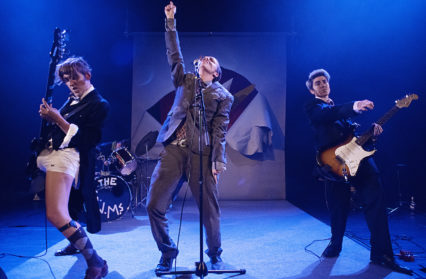Rachael Clerke describes herself as “performance maker, satirist and keen punk singer” and her current work Cuncrete combines all three of these. Hosted by architect Archibald Tactful (Clerke) with anti-virtuoso house band The Great White Males, the show is described as a gratuitously sleazy and joyfully noise critique of alpha-masculinity and the built environment. Expect original music, grotesque posturing, sharp suits and wet cement.
Speaking with Clerke, she explains that the show was formed before the band, but when the idea to have a band struck it was too good an opportunity to miss. She talks about starting out with wanting to “make a show called Concrete” which quickly morphed into an exploration of “cold and hard and ugly post war architecture” and in researching this a realisation that “masculine politics and idealistic elements are in contrast.” Research for the piece was very “hands on”, with Clerke visiting as many types of concrete buildings for inspiration as she could. The show itself takes in the post-war period, 80s new builds and contemporary building work. Asked about favourite buildings for the research Clerke references The Barbican centre “as a cliché, but a cliché for a reason”. Also making the cut of top inspirations are Swansea Town Hall and the memorable tour of Bristol Card Parks with the help of an NCP guide, where they also filmed the trailer for Cuncrete.
Clerke goes on to talk about using JG Ballards’ novel High Rise for research and from there getting interested in the people behind the concrete structures, the architects. In Cuncrete, Clerke’s character Archibald Tactful is described as both architect and God-like. “He began more as an architect,” she says, “then morphed into something God-like and is now back to being an architect again.”
The band are made up of four female performers besides Clerke as Tactful, all of them in drag business suits. Clerke talks about creating distinct characters. “There is a politician, a landlord and a banker, but the performance and the performers give them a sense of individual personality. We’re all minorities, even within the majority.”
For Clerke this becomes another way of deconstructing power, a way to be powerful but while also “taking the piss.” She recalls a previous show in 2014 when she performed as Trump, “Back when Trump was still a joke. And that element of dressing up, becoming the man who thinks he is all powerful, is a way to deconstruct and destabilise that power.” In using drag to play characters like Trump, Clerke describes a way of “stepping inside people you feel powerless against, becomes empowering.” “What drag is also good for,” Clerke reflects, “is making this strange and abstract, and allowing us as performers or audiences to talk about things that are challenging – the idea of a ‘hypernormalisation’ approach that allows for a step back, and the ability to consider something that is normally at once too big a concept or too seemingly banal to discuss. When you put four female people in business suits it shifts things.”
Despite the serious and theoretical overtones of drag, Clerke talks at length of the sense of joy that goes into the show. Humour is important to Clerke, and is integral to the way she works, but she doesn’t “see humour as integral to political work”. “It’s an easier way to challenge difficult ideas and offer audiences a way to engage. Drag has humour and has the associated empowering element.”
This is the end of Cuncrete’s “Farewell Tour” and Clerke is particularly excited to be performing within the kind of concrete architecture that inspired the piece (Aberystwyth Arts Centre for example). An added immersive element, perhaps, for this performance-adventure of original music, grotesque posturing, sharp suits and wet cement.
Cuncrete is at Aberystwyth Arts Centre on 10th November.












